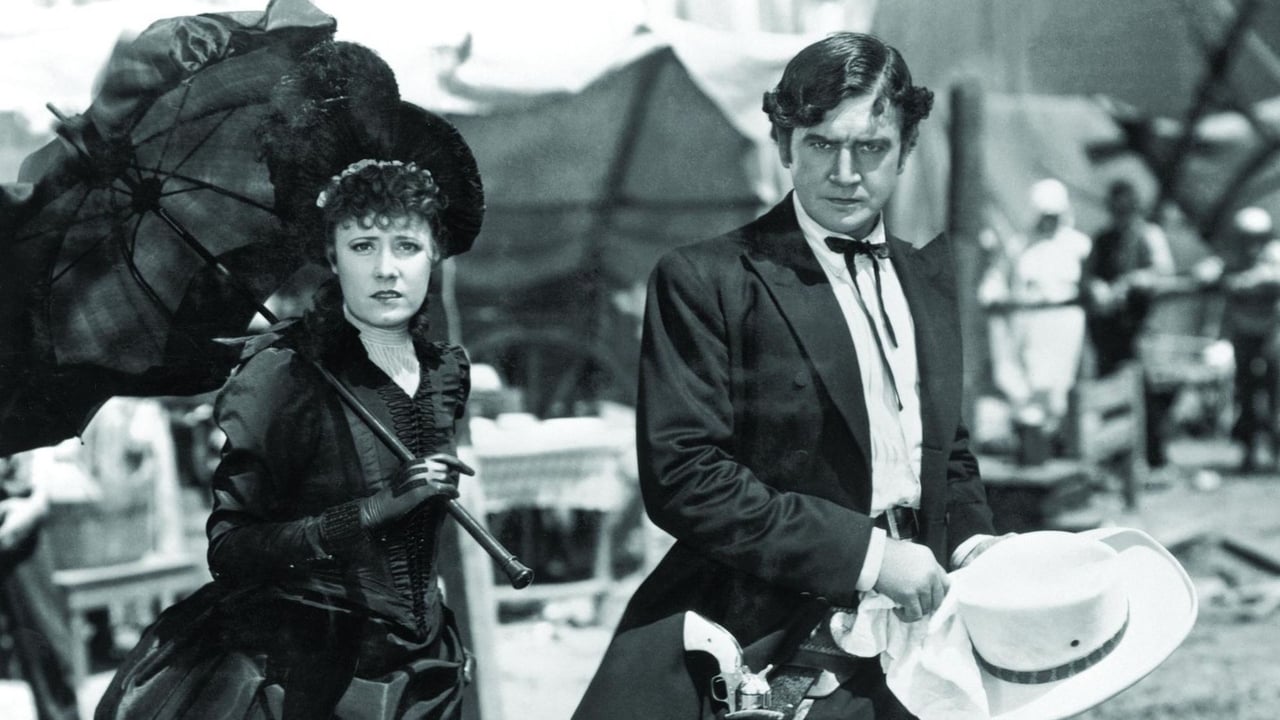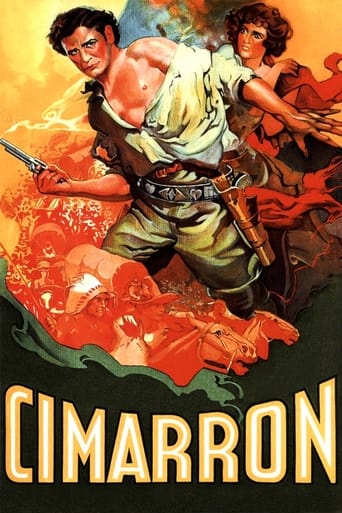

I know this gets VERY maligned these days as one of the very worst winners ever of the Best Picture Oscar, especially considering 'The Front Page' was the definitive best of those nominated that year, at the 4th Academy Awards ceremony (and that great films such as 'City Lights', 'Morocco' and 'Frankenstein' didn't even get nominated), but if you can take away Richard Dix's horrible overacting (I can't believe he was even nominated for Best Actor that year!) and uneven, sometimes lethargic or indifferent pacing and direction, certain scenes really pack a wallop, I'm glad that I watched it, and it's certainly not the worst Best Picture Oscar-winner I have seen thus far (that would probably be 'Shakespeare in Love', if I recall correctly, but I would love to watch all of them, just to be sure), and in some ways, I even tend to prefer it to the 1960 remake by Anthony Mann, even though I adore films I have seen that he's directed (although I'm not the biggest Glenn Ford fan in the world, so that probably evens things out). Irene Dunne is a delight, as always.Though it certainly could have used a better editor (a good 30-40 minutes could have been sliced off, and no one would be the wiser), it certainly deserves at least one watch, especially if you're a history buff and want to see a decent depiction of how the Midwest was won.
... View MoreORIGINAL REVIEW: I'm going to get this out of the way: While there is no excuse for the racism, I'm also not going to vilify this movie for it. The racism seems ridiculous today, but I'm sure the various "parody" movies of the past 15 years will look ridiculous 85 years from now. Even without it, though, it would still fall flat. It opens with the Oklahoma land rush, which is still an impressive spectacle (and my sole reason for going as high as a four rating here). If Wesley Ruggles had turned it into an ensemble movie about the various participants therein, it would have been on to something. But, we are left to follow the Cravat family as they- or, mostly, patriarch Yancey- search for a fortune. To their credit, they do find it, though Yancey is absent most of the time. I have MAJOR issues with the character of Yancey Cravat. It is not so much with Richard Dix, as he does what he can with it (as most of the actors do, especially Irene Dunne). We are asked to accept a man who willingly abandons his family time after time so he can keep chasing the next big thing. He leaves them for years at a time, yet everyone thinks nothing of it. The wife, Sabra, even keeps taking him back and keeps his name as editor of the town newspaper even though it is her hard work that was put into it. I don't play around with such matters, even in movies. If we are supposed to believe that Sabra becomes an independent woman over the course, why the hell does she keep taking Yancey back every time he decides to spend time with the family? If it weren't for the opening land rush, I would be one of those asking for a negative rating option. As is, I'm giving it a generous four.UPDATE: I would like to make an addendum regarding my rant about Yancey. I have since learned that the character as portrayed in the movie is actually faithful to Edna Ferber's novel. This only infuriates me even more. As a party to parental abandonment, I think it has no place for glorification in any media. That is essentially what both Edna Ferber and Wesley Ruggles did with their incarnations of "Cimarron". (I have no interest in the 1960 MGM remake for obvious reasons.) Such a portrayal today would rightly be vilified. This somehow managed to even take some of the luster out of that land rush scene and bumped my rating down to a three.
... View More"A nation rising to greatness through the work of men and women... new country opening... raw land blossoming... crude towns growing into cities... territories becoming rich states...."In 1889, President Harrison opened the vast Indian Oklahoma Lands for white settlement... 2,000,000 acres free for the taking, poor and rich pouring in, swarming the border, waiting for the starting gun at noon, April 22nd..." And herein begins the worst Best Picture Winner in history. I completely lost interest in this film less than ten minutes in. Yes, after the one and only scene that in and of itself had true merit: The 1889 Oklahoma Land Rush, a historically accurate event which would be best described as a free-for-all mad rush. Unclaimed land at various finish lines... Ready, Set, Go! Anyway, from there it went... Well, not exactly nowhere. More like a multigenerational family saga or an epic with missing chapters, Cimarron was an onerous endeavor! Yancey Cravat (Richard Dix) is a newspaper magnate, or a lawyer, or both. He is the hero of our story, but most definitively does not act like one. I do not think, even in 1931, that is was perfectly acceptable for a man with a wife and children to, on a whim, disappear to chase another Pot of Gold at the end of a rainbow he has not even located yet. The film does not give a definitive time frame, but, he is gone for a time period of years, and then, when he feels like it, reappears as if he hasn't done anything wrong, like nothing has changed, like he has not abandoned his entire family; left his wife to raise their children. Aside from whether or not I agree with our "hero", transitions between time periods are confusing at best. Certain important events are only explained in retrospect, while others are completely ignored, leaving the viewer perplexed. No, the suspension of disbelief would not be enough to solve this films' disjointed array of loosely connected scenes. Another concern I had with "Cimarron" was its shameless discrimination and racism. Yes, the times were different. But I also do not see any other films from its time period with the same level of audacity. Sabra (Irene Dunne) is the dutiful and respectful, but opinionated and passionate wife who, in her husband's years long absences, becomes a formidable political force. Her role is one of the only redeeming qualities in the film. Along with her performance, there are a few humorous scenes involving minor characters. At times, dessert terrain and impressive landscapes make for a nice backdrop. Other than that, I found myself having little clue as to why something was happening, what the characters' motivations were, how A became B but suddenly appeared as C, where in the trajectory of the film's timeline was a scene taking place, how this film was such a success in ever way when it first came out. As if this was not enough, I have learned that Cimarron is one of only two films in history to be nominated in every eligible category, and the only one of which went on to attain the title of Best Picture. By the end of the film, when Sabra (by chance, yet they are still married!) finds a dying husband in her arms following a nitroglycerin accident, I am ever so relieved that the story, if you could call it that, has finally decided to come to an end.
... View MoreCimarron was an early talkie that made great strides in sound, allowing natural interaction between the cast and a more natural movement of the camera, allowing the filming of some truly spectacular scenes. The shots of the Oklahoma Land Rush stampede involve ground-breaking sound and cinematography that make it one of the most realistically shot scenes up to that time. Other well filmed scenes include those of Osage's dusty streets with the camera tracking the main characters as they walk along while hundreds of extras bustle about them, showing the life of a busy boom town shortly after the land rush. Unfortunately, this is pretty much where my praise of this film ends.This film stars Richard Dix as Yancey Cravat, a man who was born under a wandering star. Unfortunately, that didn't stop Yancey from taking a wife and having children, it just stopped him from taking any responsibility for that same wife and children. Through the years, Yancey chases one hair-brained scheme after another while his long-suffering wife Sabra (Irene Dunne) takes responsibility for the newspaper Yancey started but abandons time and again. Sometimes Yancey's adventures keep him home, other times they take him away for years at a time. The film focuses on Yancey's adventures, while the whole time I'm wondering what Sabra is up to. In modern times, her story is much more compelling and sympathetic than Yancey's.Richard Dix's performance is quite hammy by modern standards. You'll find yourself laughing in places that were not intended to be funny by the film's creators, and in spite of your laughter, you'll still find Yancey to be completely unlikeable. He would make a great politician in the 21st century - he is very apt at doing one thing, saying another, and still finding time for splendid oratory. Unfortunately, this film was my introduction to Dix. I didn't see another one of his films for a long time and, when I did, I was surprised to find out how good he was in his smaller non-Academy recognized performances.Remarkably, this film won the Oscar for Best Picture in 1931. Even more remarkably, Richard Dix was nominated for Best Actor for his performance in this film. Not remarkably, Irene Dunne was nominated for Best Actress for her performance, in spite of the lack of depth of the examination of her character in the film. Thus I'd say this film is worth it just to see the very good technical achievements it featured in sound and cinematography and Dunne's performance as the long suffering Sabra.
... View More